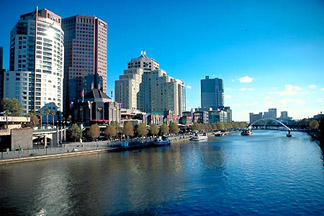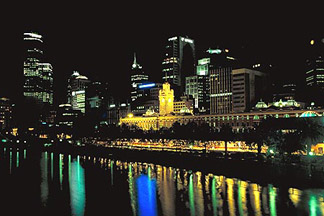
|
|
|||
|
The trip was long and tiresome. The necessary psychological conditioning, however, that one undergoes preparing for the twenty four hours of flying from Greece to Australia, is quite helpful, so when you step foot on this far away continent the long trip seems less burdensome than it was expected to be. Our destination was Melbourne. It is a modern and beautiful city with wonderful architecture, wide and endless boulevards, fast and comfortable transportation, and large green parks. Despite the fact that it is an industrial country the oceans that encircle the continent are surprisingly clean and clear. Melbourne is a rich commercial center, a very lively metropolis. The Greek presence can be felt everywhere throughout the city. According to the Greek omogeneia, as they state with pride, it is the third city in Greek population after Athens and Thessaloniki. Sydney was our second stop. The architecture and the national parks of this city exceeded in beauty and splendor those of our first stop. Sidney is justifiably considered one of the most beautiful cities of the world. Together, these two cities, Melbourne and Sydney, represent Australia. The country has been beautifully developed and has managed to use in a positive way the manpower that arrived from all parts of Asia and Europe. The inhabitants of the country took advantage of the land's natural resources and at the same time they showed great respect for the environment. It is a multicultural society, though the leading ethnicity is Anglo-Saxon. The country's democratic system is mirrored by the security and prosperity that it offers to its citizens. Here young people can find opportunities for advancement and old age is treated with reverence and respect. The latter is the element that distinguishes the level of civilization of any country. Generally speaking, Australia is a modern country that offers many possibilities of development and progress. The Australians proved their organizational skills very recently when they hosted the last Olympic Games. The Greek immigrants, after many struggles, not only succeeded in becoming established in their new homeland, but have become quite instrumental in the growth of the social and economic segment of the country. They are respected community leaders and successful businessmen. Their children have entered every field imaginable that this modern country has to offer. The Greek-Australian omogeneia live well on the Australian continent. However, they have never forgot their place of origin. Their love for Greece is not only expressed with words but also reflected in their way of life. They still hold on to their Greek traditions, provide Greek education in the various Greek schools that exist throughout the communities, and dance to the Greek music. They have well-organized church communities and have created a variety of Greek organizations and Associations. They keep updated about recent events in the old country and often respond with more sensitivity to Greek national issues than we do. Did immigration help or harm the immigrants? I am left with a feeling of reservation. Should the people who left behind their homeland be considered fortunate in their search to find a different state to settle? The Greeks of Australia, when they are challenged with such a question, respond in various fashions, according to everyone's personal story.
In Sidney we had the opportunity to see many people from Vatousa. In Melbourne our cousins Christos Vavladellis and Michael and Nina Samaras visited us. We saw our cousins Dimitri and Rallou Vavladellis and Minas and Aristi Papoutsy, our very good friends Panteli and Christina Kapetanellis, as well as Antoni Kapetanellis and George Vervellis. They extended their hospitality while we were in Melbourne and they took us to the most significant places that this beautiful city has to offer. We were touched by deep emotion because we had the opportunity to be with close relatives and dear friends. We had much to talk about the past and the present. Unfortunately however, our stay in Australia had come to an end and we did not have the chance to see everyone from Vatousa. We asked and found out that everyone is doing quite well and our wish for them is that they continue to do well and to see them in Greece in the near future. The blue waters and the gray beautiful islands of the Aegean were waiting for our return. During our arrival to our birthplace there was speculation as to how we would assess our own country, since we were absent for forty days. Everything seemed to be going better than we had expected. Olympic Airlines, the airline that Greeks abroad address negatively and rightly so at times, this time offered us a pleasant and comfortable trip. We arrived at the new Venizelos Airport in Athens right on time. The new airport rivaling and outshining the European and Asian airports in structure and modern technology! All the first signs when we arrived at the airport were excellent! Greece is producing, Greece is expanding, and Greece is forging ahead as our Prime minister often says. However, we had the first negative experience when we tried to get a cart to carry our luggage. A little man was standing behind the assembled carriages, accepting coins from each passenger when he/she received his/her cart. There we experienced a scene that left us ashamed. About forty passengers had gathered and the crowd was becoming more massive. Everybody was trying to shove the coins in the little man's palm so they could get the much-desired carts. Shouts and shoving in full display! What was my choice? I pushed my fellow passengers as well and I shoved a bill into the little man's palm. Waiting for my change I lost the cart that I had. Amidst all these chaos I had the opportunity to do some thinking. Aren't these people the same patient people, the good citizens of Australia who can be so polite when they wait for their turn to take the tram, the metro, to be waited on banks, and department stores of Sidney and Melbourne? Whatever happened to the well-bred passengers of the plane who would graciously get out of the way, so one can comfortably walk on the narrow air corridors? What happened to them when they stepped foot on Greek ground? Did they revert to their good old personalities? This phenomenon has to have an explanation. In all probability, they believe that Greece is not the same as Australia. Here "everything goes." As Terzis, the singer, expresses it, "may Greece live evermore, may the absurd live evermore." I have always liked Terzis' song, but at that moment I appreciated it even more. In all accounts this was a small episode which does not really reflect the contemporary Greek temperament or the radiance of the high-tech airport. The incident at the airport was small but the image that Greece projects to the foreign tourist can be quite negative. The airport authorities have to do something about it. However we have to be optimistic! Our relatives and friends in Australia are doing well. We are also doing well here and we will do even better in the coming years! |
|||
|
For more information about Mr. Stavrakoglou, see his brief biography at http://www.helleniccomserve.com/stavrakogloubio.html . Visitors can view other fine articles by him under the HCS archives section titled "Vatoussa." |
2000 © Hellenic Communication Service, L.L.C. All Rights Reserved.
http://www.HellenicComServe.com


